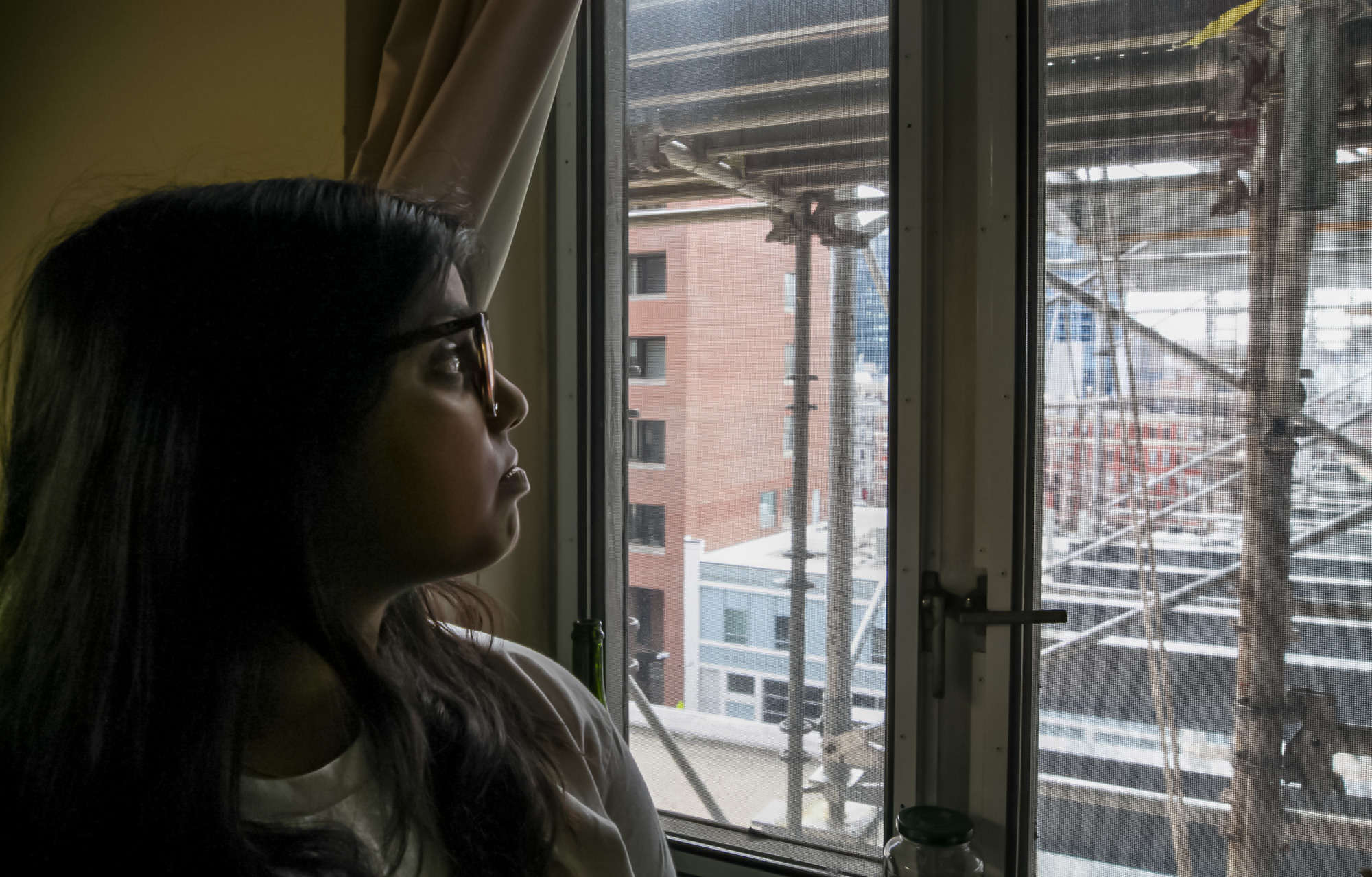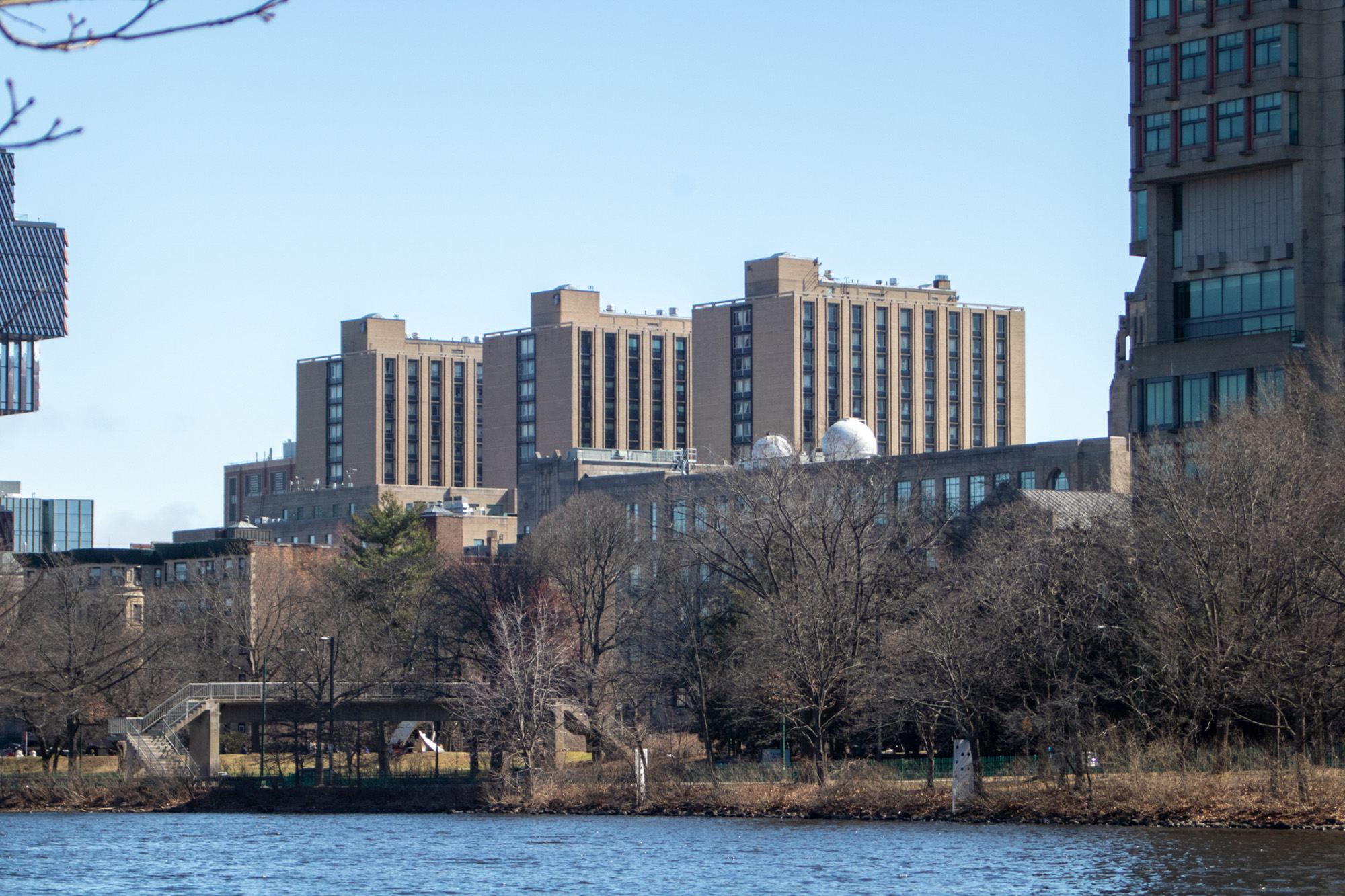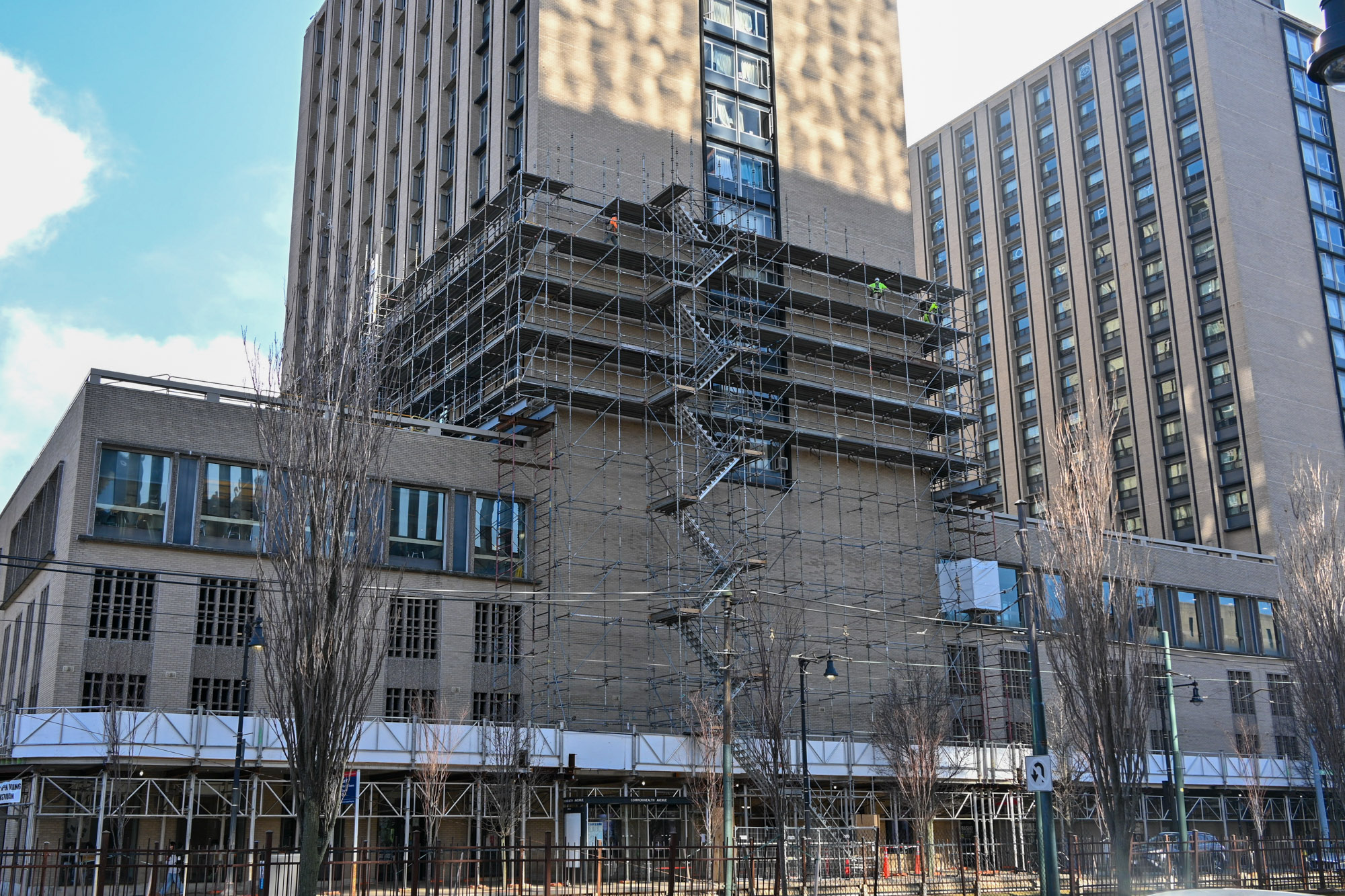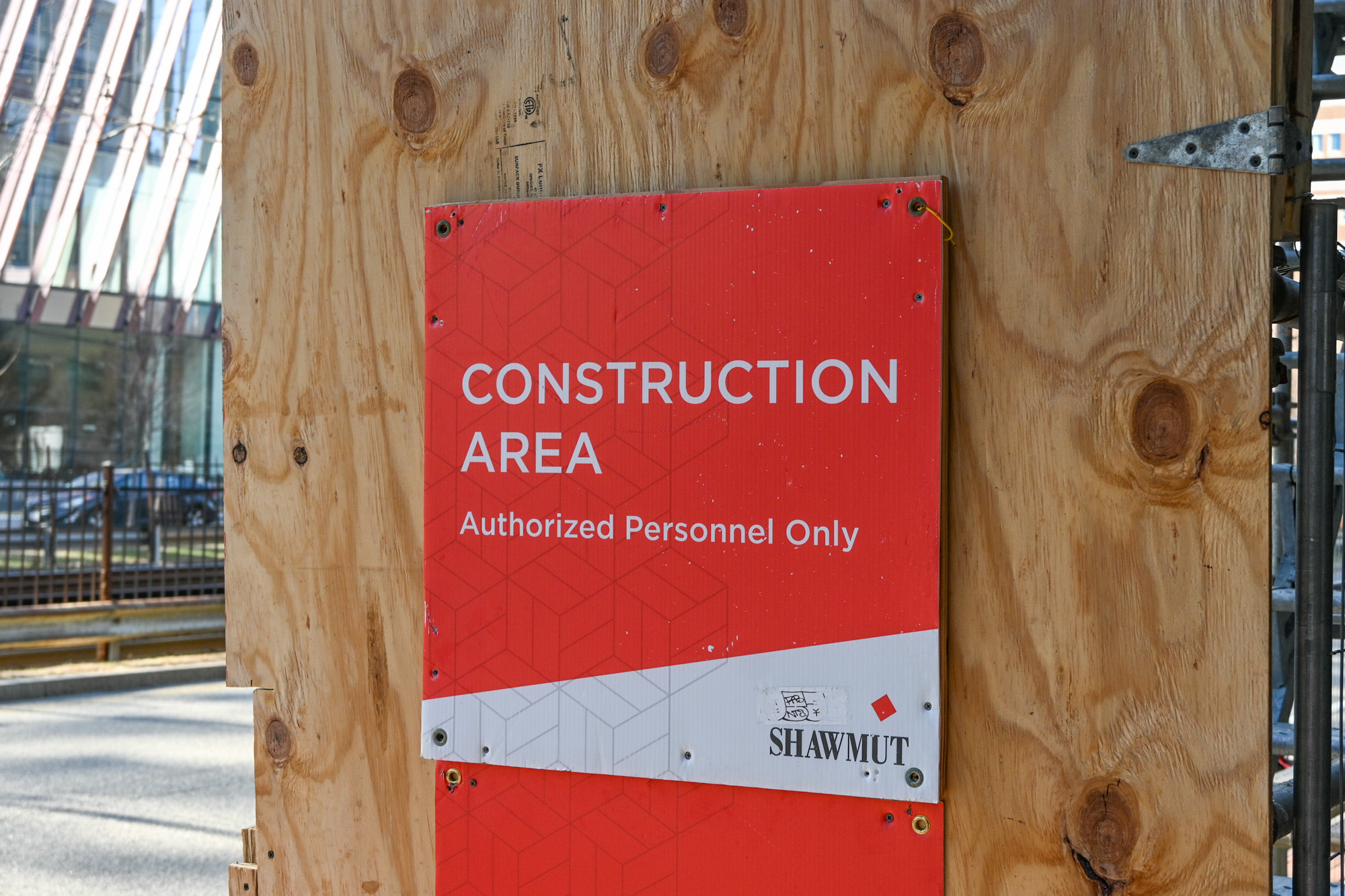Boston University students living in Warren A Tower returned from winter break to scaffolding scaling the building, loud construction noises and workers outside their windows.
Warren Towers is undergoing its first-ever full renovation: a three-year, $550 million project that began in December. Housing roughly 1,800 students, the 18-story complex is the second largest nonmilitary dorm in the country.

Hiya Verma and other A Tower residents said the University did not prepare them for the disruptions that have hindered their living situations this semester.
“I wasn’t expecting them to be there yet,” said Verma, whose fifth-floor room sits directly at the level of the construction work. “I hadn’t been notified at all.”
Verma, a sophomore, attended a BU information session Dec. 9, where staff said construction workers would have a 9 a.m. to 5 p.m. weekday work schedule and ensured students would be notified before work started.
This was not the case for Verma, who saw a construction worker outside her window when she returned to school in January.
Verma voiced her concern to her RA, who relayed the information to the construction team.
“Only after we confronted them, and those notices told us that construction would be done Monday through Saturday, which was different than what we were promised,” said Verma.
Then came the early morning noise. Then, the late nights. Then, construction on Sundays.
Collin Pachilis, a freshman and former Warren Towers fifth-floor resident, said the schedule in BU’s weekly construction updates was not followed. Upon contacting the construction team, they confirmed that extended hours beyond the initial schedule were sometimes necessary, according to Pachilis.
Pachilis also documented constant drilling, hammering and pounding outside his window. He eventually requested a room change Jan. 26, sending his evidence to BU’s Housing department through email.
To address student concerns, Jason Grochowalski, associate director of residence life for administration, suggested in an email to A Tower residents they “adjust [their] window treatments (shades, blinds, etc.) as needed” while construction occurs.
“We do certainly understand that disruption can be difficult, particularly if you’re trying to study,” said BU Spokesperson Colin Riley. “But we take that into consideration during quiet periods, finals, etc.”
Starting next year, one tower will be closed at a time, while students occupy the other two, until the project’s end in 2028. Students living far from the construction are unlikely to be affected, but for those on A Tower’s fifth floor, the impact has been drastic.
“I couldn’t sleep, I couldn’t be in the room, I couldn’t exist there at all,” said Pachilis.

BU Campus Planning & Operations and LeftField Project Management — both heading the Warren Towers renovation project team — did not comment about the renovations, and redirected all communication to Riley.
Managing large-scale construction projects like the Warren Towers renovations presents significant challenges, especially when students are living on site.
“We’re talking about million-dollar projects. These things have to go forward,” said Joe, who has been a dormitory operations manager at a college in Massachusetts for 20 years. “Notifying the population and keeping them updated [is] not priority one.”
Joe requested The Daily Free Press only use his first name to avoid conflicts of interest between BU and his institution.
While communication with residents is essential, Joe explained it often takes a backseat to financial and logistical priorities. However, he said BU’s lack of communication is not commonplace.
“In [BU’s] mind, they may be thinking they’re handling it correctly, but it sounds to me that there’s a lack of information not being disseminated to the residents mostly affected,” Joe said. “The people that are going to be impacted are not being notified.”
Despite the numerous issues resulting from the project, the renovation was long overdue. The Trustees of Boston University reported poor conditions in the roof systems, multiple accessibility issues throughout the building and dated plumbing systems more than 50 years old, according to the 2024 BU Warren Towers Expanded Project Notification Form.
The Warren project had to pass a public review from city officials and the BU Charles River Campus Task Force. The task force, which has been reviewing the University’s development projects since 1986, consists of 17 representatives from BU.
Maha Uddin, a freshman resident of Warren A Tower fifth floor, said she was unable to open her windows during the work day because of the abrasive noise and scaffolding directly outside.
“They’ve turned the heat up so my room is burning, but I can’t open the window because it’s so loud,” said Uddin. “I don’t think I’m going to get sunlight anymore.”
Similarly, Verma added she was unable to open her windows because of equipment outside, even when workers were not present.
“Even outside of 9 a.m. to 5 p.m., their equipment interferes with my ability to just get fresh air in my room,” said Verma.

Pachilis, unable to deal with the disruptions in his room, requested a housing change.
“The housing availability that is being discussed would lead to an increase in housing cost this semester and no meal plan,” Jonathan Bisceglia, A Tower resident director, wrote in an email responding to Pachilis’ request.
It currently costs $6,090 a semester to live in a double in Warren Towers. For the past five years, housing rates have increased annually. From the 2021-22 academic year to the 2022-23 academic year, housing rates increased by 2.4%, according to calculations by The Daily Free Press.
From this year to the 2025-26 academic year, housing rates will increase by 5.1%.
After back-and-forth conversations with Housing and the Office of the President, Pachilis was finally placed in a single room on West Campus for the same rate as his previous room Jan. 28.
While current Warren residents deal with the noise and effects of the construction, the project’s timeline reveals a wider impact.
A Tower will be closed starting this summer, and the 595 freshman that would have lived there will be housed on Fenway Campus — nearly a mile from the Charles River campus.
With renovations limiting the number of beds available, undergraduate students will also be housed in Peabody Hall in Fenway Campus, which was previously graduate student housing. Graduate students who lived in Peabody Hall were told to move out by July 15.
Despite the distance, Riley said students will have access to resources like Fenway Dining Hall, the BU shuttle, staff like hall directors and resident assistants.
Housing mostly freshmen, Warren Towers has been a cornerstone of the first-year experience at BU since its construction in 1965.
Shiven Dhawan, a sophomore and Fenway Campus resident, referred to Warren Towers and West Campus dorms as “the essence of freshman housing.”
Riley said housing first-year students together on Fenway could foster a sense of community and help with the transition living away from home.
“There are a lot of activities [at Fenway],” said Riley. “We had experience previously with housing first-years there during an entire semester, and the experience was very positive.”
BU students received an email Jan. 31 reminding them to secure housing for the 2025-26 academic year. Three days later, BU Housing Director Steve Prue told Fenway residents in an email that their rooms will not be available to them next year due to the incoming freshman.

Prue wrote that these students “will be among the first in your class to select housing” and assured them they would have on-campus housing available.
Despite the priority selection for next semester, some Fenway residents said they were blindsided by the information.
“I don’t know when the decision was made that they were going to put the kids into Fenway, but they had to put them somewhere,” said freshman Fenway resident Misha Van Uden. “It would have been nice to know when I moved in, you’re not going to be able to stay here next year.”
Dormitory closures are common in construction projects, Joe said. After ongoing construction led to dormitory closures, his institution resorted to housing undergraduate students in graduate housing. He dealt with nearly 400 displaced students because of the closures.
Between displacements, lackluster communication and inconsistent scheduling, many students said the renovations have been mishandled.
Verma said despite Warren’s unpopularity among students, she was initially excited for her centrally located room. Now, she has to leave her room if she wants to rest, make a private phone call or see the sunlight.
“It’s ridiculous that I’m paying for housing when I’m clearly not getting the experience I was promised,” said Verma. “I’m paying for a room that I can only use half the time.”